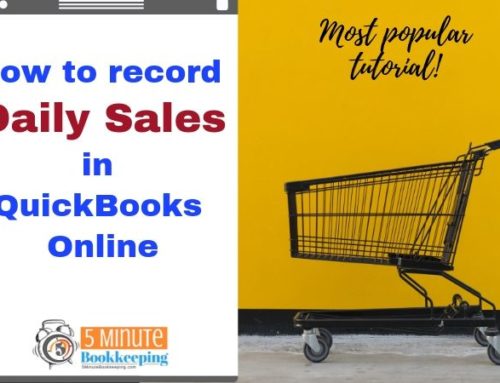
About 5 years ago I used to attend a lot of networking events to promote my business. I clearly remember standing at a restaurant talking to a member of my networking group. He looked at my nametag and he remarked “You’re a Certified Public Accountant!”. I said yes. Then he wondered what I was doing there since it was the middle of tax season. He asked me “why aren’t you working on tax returns right now?” I can’t tell you how many times I have been asked the same question because I am a CPA.
Actually, CPA’s specialize in different areas – like doctors and lawyers. I happen to be one of those CPA’s who specializes in QuickBooks and accounting and not on taxes. Given that it is tax season, I thought I would share with you tax-time smarts for small business owners.
I found these at the Intuit Small Business Center. I thought they were really helpful.
Using QuickBooks Online to make tax time easier
How do you make tax time easier? Use QBO of course! You can give your tax preparer access to your QuickBooks Online so that they can get the reports that they need. It’s so simple! [Click here to know how]
When is my tax return due?
Here is the 2016 small business tax calendar with due dates that you need to know. March 15th is a really important date. Tax returns for C-Corporations and S-Corporations are due. Individual tax returns are due on April 18th. You get a few extra days because April 15th is a holiday in Washington, D.C.
What if you can’t file your tax return on time?
Don’t worry. Your tax preparer can file a 6 month extension for you. Remember that this is an extension to file but not an extension to pay your taxes. You need to send the IRS a payment if owe money to them.
What else should you give your tax preparer?
Normally, you don’t need to send your tax preparer any business receipts or documents unless they ask for them. My tax preparer only asks for my QuickBooks reports and copies of my W-2’s and 1099’s. He also sent me a questionnaire which I filled out and uploaded to his portal.
It’s always best not to overwhelm your tax accountant with anything they don’t ask for or need. That’s just more stuff they have to spend time reviewing.
One tool I used to keep track of receipts in case I need them is ReceiptBank. I’ll write a separate blog post on ReceiptBank with all the details. Suffice it to say for now that it is an awesome tool. You can take pictures of receipts with your smartphone directly into their app and forward emailed receipts to your email address at ReceiptBank.
Tax basics for corporations
Here is a great article explaining the basics of taxes for C-Corporations and S-Corporations. One of the most important things that small business owners seem to forget is that corporations are legal entities separate from their owners. As such, you should really avoid paying for personal expenses out of your corporation. It’s best to take a distribution or take a salary from your corporation and pay for personal expenses with those funds.
Did you know that corporations also pay lots of different taxes at the federal level? They may include corporate income taxes (C-corporations), estimated taxes (C-corporations), and employment taxes (such as payroll, Social Security, and Medicare).
Tax basics for self-employed and sole proprietors
Check out the Complete Guide to Taxes for the Self-Employed. Can’t make sense of 1099’s, 1040’s, Schedule C’s and self-employment taxes? Don’t worry. This guide clearly explains these forms, goes over estimated taxes, and more.
Navigating the IRS
This is a great article on navigating the IRS for small business. The author has great tips for calling the IRS, navigating their website, obtaining forms and publications, getting your IRS transcript, checking your refund, and more.
Did you know that if you call the IRS you can expect to be on hold for about an hour? Hopefully you can get answers to your questions from their website rather than calling the IRS.
Here’s my tip for dealing with the IRS – be sure that you open any mail received from the IRS as soon as possible and take care of it as quickly as possible. The IRS, like soufflé, wait for no one. Do be careful with scams that appear to be from the IRS. The IRS never emails you or calls you. They always send you a letter. Check with a tax accountant if a letter from the IRS looks like it may be scam.
Closing
I’ve shared with you a few tax-time smarts for small business owners. If you haven’t done so, I encourage you to invite your tax accountant to your QuickBooks Online file so that you don’t have to lift a finger – they can get all the reports that they need.
I wish you all the best this tax season. The best thing to do at tax time is to give your tax accountant whatever they ask for as soon as possible so that you don’t have to wait till the last minute to file your taxes. Your tax accountant will thank you!
For more QuickBooks tutorials and small business tips, don’t forget to subscribe below. Please share this article to your friends who need help with QuickBooks and taxes.
















From this article,I get to understand how quick books online can really help when it comes to tax time.There is no need to panic since these tips really cover everything.The process is now very clear and I will definitely put it into action.Thank you!